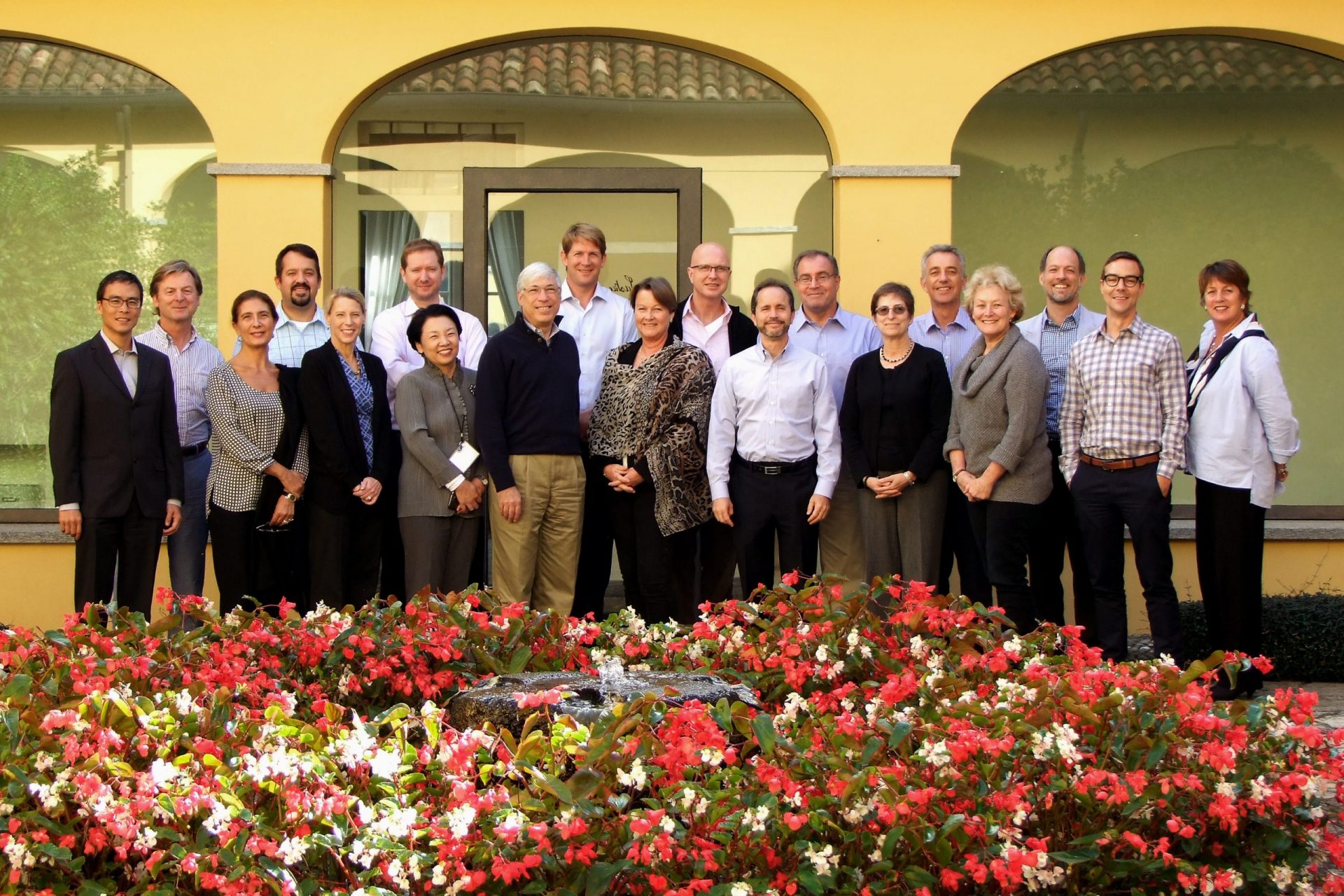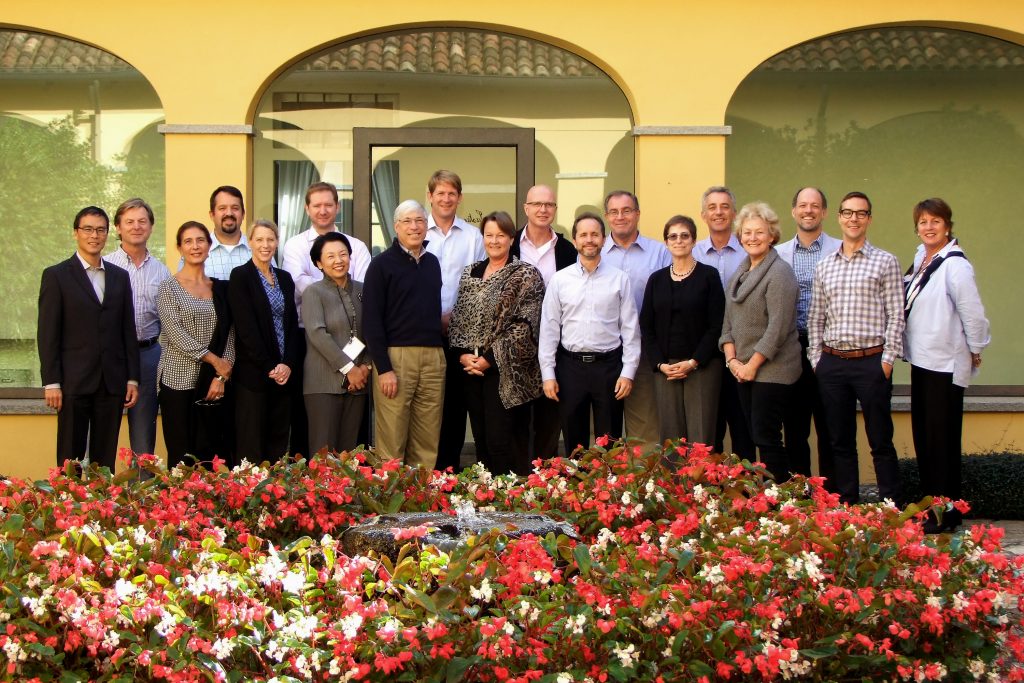Mark Kramer, of Creating Shared Value fame, recently brought a group of people together in Bellagio, Italy, to reflect on progress being made to advance business and complex societal interests together and how this could be accelerated. Participants came from diverse backgrounds in terms of geography, professional focus and sector. I provide personal reflections on highpoints of the meeting.
The rise of ISIS and Ebolas widespread impact on the global psyche adds to long standing deep concerns about slow progress in tackling rising inequalities, jobless growth and climate change. These and related issues are challenging business-as-usual strategies, leading to a plethora of innovative ways forward.
Early in the meeting, one participant suggested that each of the many initiatives underway addressing various aspects of business-society interactions were like individual pearls, things of value and beauty. She suggested we needed to thread the pearls into one necklace to have real impact. Doing that would bring together separate initiatives each with their own semi-proprietary nomenclature, measurement approaches and lead players. Maybe that would lead to wider and faster systemic change.
Kramer and Porters shared value landmark article in 2011, initially supported by Nestle, complements work under the rubric of the Triple Bottom Line by Novo Nordisk, or Performance with Purpose led by PepsiCo. All are pearls. All challenge Milton Friedmans notions about the centrality of shareholders primacy in decisions about corporations. Decisions that often lead to an excessive focus on the short term at the cost of longer term growth that tackles societal needs and issues. Participants cited the work of Lynn Stout that questions the legal basis of Friedmans arguments, and the work of Ray Fabius and Robert Eccles that shows how investing for the long term is associated with faster corporate growth even as benefits to employee health and the environment accrue.
Many measurement pearls were cited. Acronyms now dominate the field of sustainable investing or is it socially responsible investing, or just sensible investing? The Dow Jones Sustainability Index, GRI, FTSE4Good and C4 all try to capture corporate actions in areas related to finance, social impact, governance and diversity. Few take a truly integrated approach as recommended by Mervyn King. A very powerful comment that our current financial accounting system is bust resonated with participants. There was a sense that more effort is required to build a more effective system that would guide corporate decisions and investor analysis towards supporting actions and companies truly benefiting society as they maintained or increased their profitability.
New legal frameworks like B-corps are attracting mid-size companies seeking to differentiate themselves from competitors on the basis of positive societal impact. And we learned of many multi-company initiatives starting to reach scale through their partnerships with governments and NGOs. The thousands of new initiatives stimulated by the Clinton Global Initiative over the last decade have been documented to have improved the lives of millions and people and addressed many complex environmental issues. Early projects drew heavily upon corporate social responsibility and philanthropy investments, which have increasingly shifted towards leveraging the core capabilities of business for social impact. The World Economic Forums Grow Africa program has mobilized agricultural, retail and food companies to work with key African governments to address food and nutrition needs in pragmatic ways.
With all of these new initiatives underway, we asked what it takes for CEOs and corporate leaders to adopt such approachesand conversely what constrains them. While the financial arguments were critical, most agreed that the core values and vision of leaders matter just as much; both are essential to creating shared value. Values often trigger change, with better financial results in time as the rewards which reinforce change. In terms of constraints, the role of activist investors, underinvestment in innovation and science, and weak uptake of partnerships with governments and NGOs to share costs, expertise, and actions all emerged as critical. Future CEOs and CFOs need to be as aware of the Millenium Development Goals (soon to be the Sustainable Development Goals) as they are of their P&L! It was clear that unmet business opportunities lay in addressing SDGs in more innovative ways.
Some sectors faced an easier task than others. Pharmaceutical and medical device companies win as product use increases and with minor exceptions so do patients. Many food companies win as overall consumption increases but that often comes at a cost to health and the environment even as billions of consumers benefit from access to food. Extractive companies win as energy and commodity use increases, but that exacts major costs to the environment even as consumers obtain electricity and fuel for transport, heating and production. As tobacco companies win in terms of increased sales, their consumer risk of death increases. We discussed how all companies can make progress in some way and that the biggest opportunities for win-win-wins between companies, consumers, and the environment lay in moving though the complex grey zone.
All companies win when they address good governance, workplace and board diversity, and employee health, the last item being a missing pearl and the subject of new work underway.
Threading the pearl necklace will not be easy. Not all the required pearls have been identified. Some are tarnished. Others look shiny but fade fast. But the discussion is underway, and those present in Bellagio came away even more committed to making progress so the question is, will you join us?

Source of thumbnail image, An Examined Life blog
Note: Derek Yach is the Executive Director of the Vitality Institute, and Chairman of the Board of Cornerstone Capital







